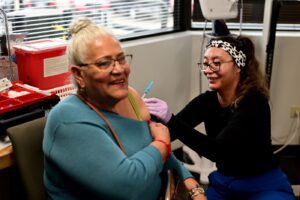With teens relying heavily on their friends and social connections for emotional support, the restrictions imposed to contain COVID-19 are especially hard on them. The C.S. Mott Children’s Hospital National Poll on Children’s Health asked a national sample of parents about the emotional impact pandemic restrictions have had on their teens aged 13 to 18.
In the poll, 46% of 977 parents of teens said their child has shown signs of a new or worsening mental health condition since the start of the pandemic. In addition, 3 in 4 parents say COVID-19 has had a negative impact on their teens being able to interact with friends. Also, 1 in 3 girls and 1 in 5 boys have experienced new or worsening anxiety since March 2020, and half of parents have relaxed family rules to allow their teen more contact with friends.
We spoke with Wilfred van Gorp, PhD, a New York-based neuropsychologist in practice for over 30 years, about the Mott Report and how the pandemic has impacted the mental health of teens.
Continue Reading
What kind of mental health issues are children, teens, and young adults going through during this COVID-19 pandemic?

Dr van Gorp: What I see are a couple of things. One is, whatever they’re going through now is definitely an exacerbation of whatever they were going through before.
For example, if they had, let’s say, attention issues before, whether it rose to the level of ADHD or not before, it’s worse now. If they had some element of sadness before, now they have depression. If they had some anxiety before, now they have clinical anxiety. And if they had an anxiety condition before, it’s worse now. We’re seeing a lot of depression, a lot of anxiety, and then we’re seeing exacerbations of other clinical conditions like ADHD.
Is there any difference in the mental health issues during the pandemic for children, teens, and young adults or are they all the same?
Dr van Gorp: I think mental health issues are particularly visible now in teens and young adults, even more so than for younger children. Socialization is so important in that life stage of development and is such a key aspect of their development at this age.
We might use the term “arrested development,” where basically they’re sort of locked down in a sense since they’re not able to go out. Sometimes parents make exceptions, but mostly kids are stuck at home. At most they’re doing Zoom calls or FaceTime with their friends. There’s just not the same socialization process. And I think it’s hitting them even harder than it is younger children or adults.
Are there any warning signs that clinicians should be looking for in their patients during these times, or is there anything different that they should be looking out for in their patients?
Dr van Gorp: Changes in grades are something to look for, even though for most, school has been done by distance learning. Often, the teen or young adult will say, “I’m not able to concentrate so well.” What that really means is “I’m depressed.” They also might verbalize their feelings using metaphors.
Also, changes in sleep and changes in eating patterns are things to look out for. These are things that mental health professionals, especially psychiatrists, know so well but need to be on the alert for.
Here’s the other thing that I think clinicians and psychiatrists should be alert for. In my practice, parents seem to minimize verbalizations of their child’s or adolescent’s complaints of depression and anxiety as, “Well, everybody is going through this during COVID. This is normal. Everybody is depressed and anxious during COVID.” And although to some extent that’s true, that doesn’t mean it’s not important. I hear parents say all the time, “But isn’t everybody anxious during COVID?” Which is in a way, just writing it off. I think that’s doing a disservice to their adolescent child or their teenage child. But I hear that so often.
According to the Mott Poll Report, 25% of parents report encouraging their teen to try a web-based program or an app to improve their mental health, and 60% say it has helped. Why are apps a good idea for young people?
Dr van Gorp: The concept of apps is a great one, and I encourage the use of them. I think harnessing technology for this is a great idea and should be encouraged. The reason that they’re so good is because apps engage people and give them tools to use. Anything that gives people more tools to use to help themselves is beneficial. The more a person can develop and garner tools on their own through an app or through another means, so much the better. It empowers them to help take control of their lives through the use of technology.
What type of long-lasting effects do you think that young people could experience as a result of this current pandemic?
Dr van Gorp: There’s a critical socialization period in young adults, and so now they’ve got a lot of catching up to do. So they’re going to have some lacunae, in a sense, in their social development.
Also, once you develop a depressive or an anxiety condition, there’s the risk that it can recur as you get older. You have a statistically higher risk of that occurring as you proceed through life. It’s really not the greatest scenario.
Is there anything that clinicians need to be aware of concerning these long-term effects?
Dr van Gorp: If they can be proactive and recommend activities that will potentially ward off depression, ward off anxiety conditions, then we’re in a much better position to prevent these episodes of depression and anxiety. We can use preventive psychiatry to prevent these episodes. That will put the teen and the young adult in a much better position later after the pandemic is over. I think preventive psychiatry during the pandemic is very much the way to go.
Almost 1 in 4 parents in the Mott Poll Report said that their teen was experiencing negative changes in their sleep. What can you tell me about sleep in teens and young adults during these troubling times?
Dr van Gorp: Sleep is very important. When anyone, and this certainly includes young adults, doesn’t get enough sleep, they’re at risk for depressive episodes. So, as the teens and young adults are bored at home with nothing to do, they’re staying up on their iPhones. They’re staying up on their computers. In the preventive psychiatry model, we want to encourage good sleep hygiene to prevent these conditions. Just because they’re bored, it’s not a reason to stay up at night on the computer until all hours.
Is there anything else you would like to add?
Dr van Gorp: Regarding the Mott survey, the thing that occurred to me was just how about everybody is anxious during the pandemic. So, they write it off. I think that’s the biggest mistake people make, and I think that’s a mistake to do that.
Reference
Mott Poll Report: How the pandemic has impacted teen mental health. C.S. Mott Children’s Hospital. Published March 15, 2021. Accessed April 12, 2021. https://mottpoll.org/reports/how-pandemic-has-impacted-teen-mental-health
This article originally appeared on Psychiatry Advisor





